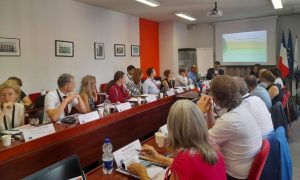Numerous justice professionals came together at a Symposium to address the difficulties faced in implementing Framework Decision 2008/947 and to explore ways to make its application more efficient. The event contributed to raising awareness and encouraging the utilisation of this instrument, particularly in relation to foreign nationals under probation measures in Europe.
Foreign nationals are overrepresented in the prison population of various EU jurisdictions, a potential indicator of a preference for custodial measures over probation or alternative sentences. In this context, European mutual recognition instruments that can promote a focus on alternative sanctions, such as Framework Decision (FD) 2008/947, which governs the transfer of probationers among member states, remain scarcely used by professionals.
By aiming to expand the application of this European instrument, the J-CAP project hopes to enable more foreign individuals to serve their sentence in the country where they hold closer familial, linguistic, and cultural ties.
The project consortium has organised the 1st J-CAP Transnational Awareness-Raising Symposium, bringing together judges, prosecutors, lawyers and probation professionals in order to discuss the existing hurdles facing effective implementation of Framework Decision 2008/947/JHA. The aim was to identify concrete steps to streamline its application and promote the rehabilitation prospects of sentenced individuals.
The event was hosted at the headquarters of the project partner IGO-IFJ (Judicial Training Institute) in Brussels, Belgium. During the 13th – 14th of June, 2023, the occasion emphasised the pressing need to raise attention and awareness of this European mutual recognition instrument. It also underscored the importance of increasing its utilisation, particularly due to the current significant numbers of foreign probationers in Europe.
This gathering was also an excellent opportunity to hear directly from decision-makers. In this sense, Ms Anastasia Pryvalova, representing the Council of the European Union, stressed the importance of expanding the application of FD 2008/947, particularly considering the 9th round of mutual evaluations on mutual recognition legal instruments in the field of deprivation or restriction of liberty.
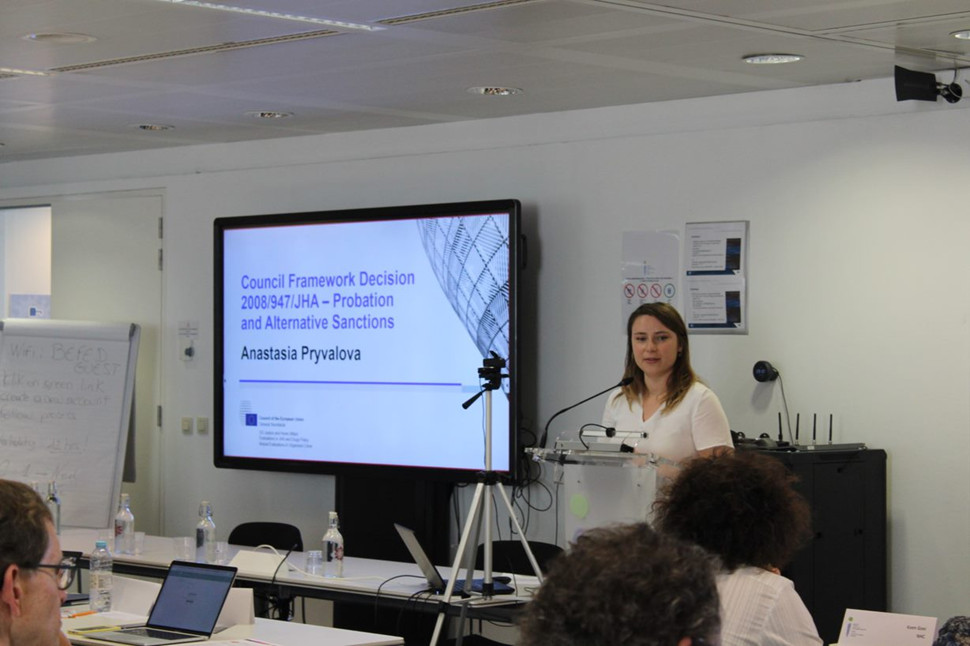
Overcoming barriers and focusing on solutions
The Symposium’s primary focus was to address the day-to-day barriers that hinder the successful transfer of sentences throughout the European Union. Professionals involved in real-life proceedings shared their experiences, shedding light on the significant difficulties often encountered in the mutual recognition of sentences. Amongst others, lack of communication, difficulties in identifying similar and corresponding measures, and gathering knowledge on Member States’ judicial systems were specifically highlighted.
Practitioners from Portugal (Ms Marta Bulhosa, lawyer), The Netherlands (Ms Amarens de Boer, probation officer) and France (Ms Emmanuelle Laudic-Baron, magistrate) shared their experiences and insights.
The afternoon session provided an opportunity to convert insights gained from the discussions into practical knowledge. Cross-national group discussions centered on analysing a case study, fostering dialogue among participants and facilitating the exchange of information and best practices.
Practitioners from various countries shared their national procedures concerning the implementation of FD 2008/947, both as issuing and executing States. This session highlighted how a better understanding of procedural differences at the national level can facilitate the subsequent analysis and targeted application of sentences, thereby promoting mutual recognition.
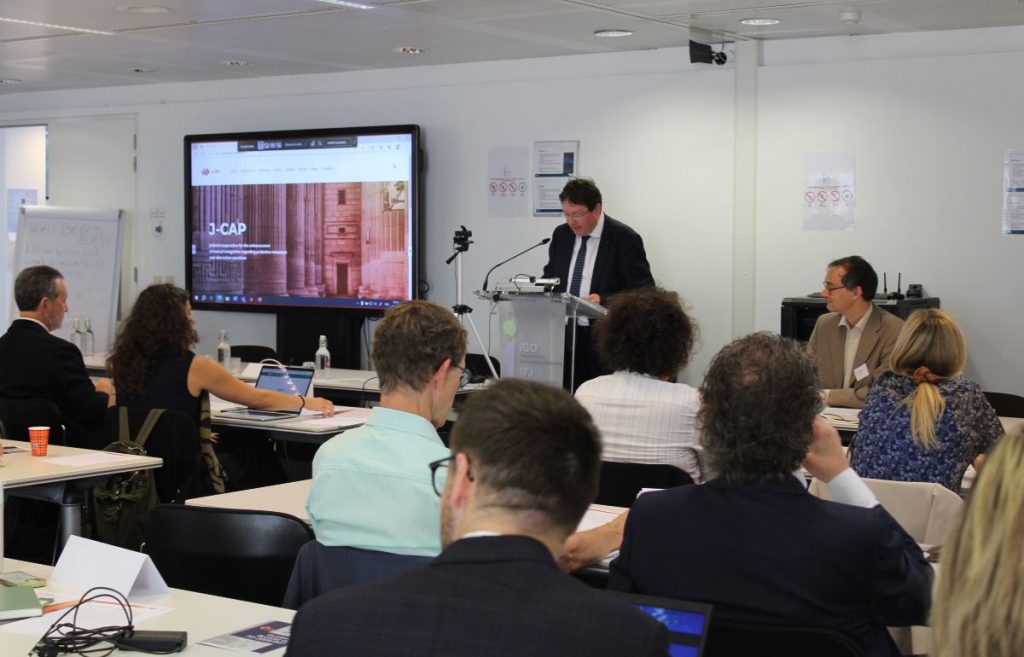
Expanding mutual knowledge and understanding
The second day of the J-CAP Symposium explored procedural differences at the national level. Furthermore, a presentation on available tools to assist practitioners working with the FD 2008/947 was delivered. Mr Vlad Andriescu (a Judge from Romania) provided significant insights into the functioning of one of these tools – the EU Judicial Atlas, along with a brief guide on completing the transfer certificate.
The Symposium concluded with a field visit to the House of Justice in Brussels, emphasizing the necessity for judicial systems to uphold the main principle underlying—FD 2008/947 – the promotion of rehabilitation prospects of sentenced individuals.
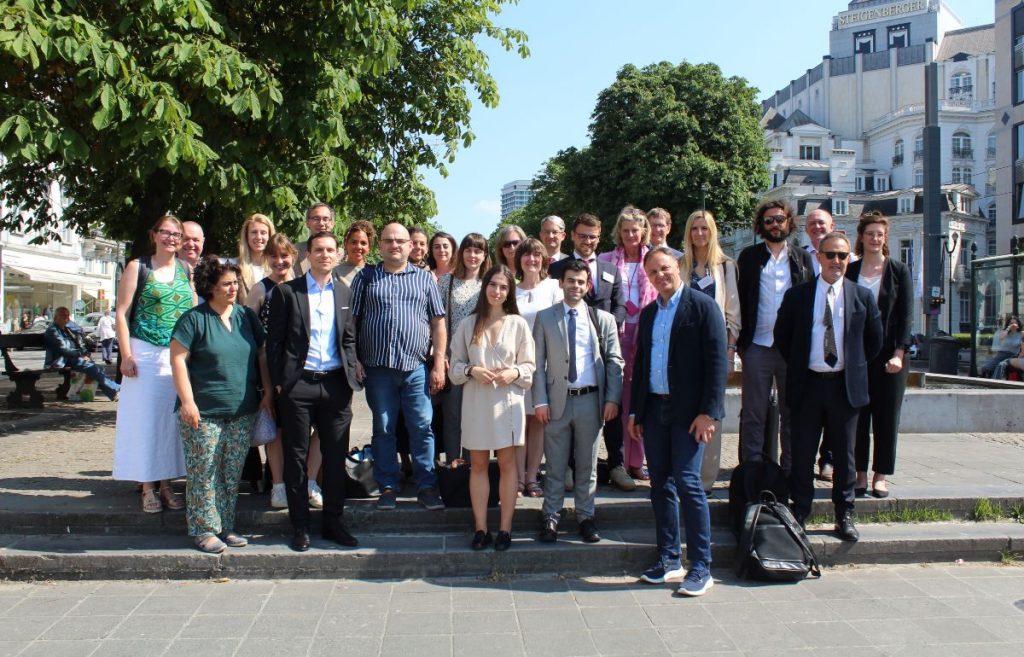
Know more about this project

JCAP
Judicial cooperation for the enhancement of mutual recognition regarding probation measures and alternative sanctions
The J-CAP project is coordinated by IGO-IFJ – Judicial Training Institute (BE) and partnered by IPS_Innovative Prison Systems (PT), Agenfor International (IT), European Strategies Consulting (RO), the National School for the Judiciary (FR), the Netherlands Helsinki Committee (NL), and the Department of Applied Sociology of Law and Criminology at the University of Innsbruck (AT).
To know more about the J-CAP project please visit www.jcap-probation.eu
Related projects

NO-OBLIVION
Promoting Universal Jurisdiction while Evoking the Crimes Committed within the Former Yugoslavia
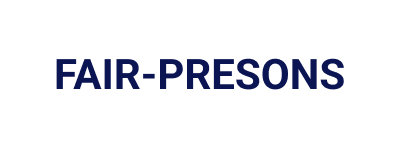
FAIR PRESONS
Fair predictions of gender-sensitive recidivism

PRE-TRIAD
Alternative pre-trial detention measures: Judicial awareness and cooperation towards the realisation of common standards

PRE-RIGHTS
Assessing the impact and performance of preventive measures on EU Directives and Framework Decisions

FAIRNESS
Implementation of the Stockholm’s Roadmap in cases of terrorism and radicalisation

AWARE EAW
European Arrest Warrant
Related news

Promoting Universal Jurisdiction while evoking the crimes committed within the former Yugoslavia
Read More »
Improving the effectiveness of the European Arrest Warrant: promoting knowledge, cooperation and trust to protect fundamental rights in the EU
Read More »